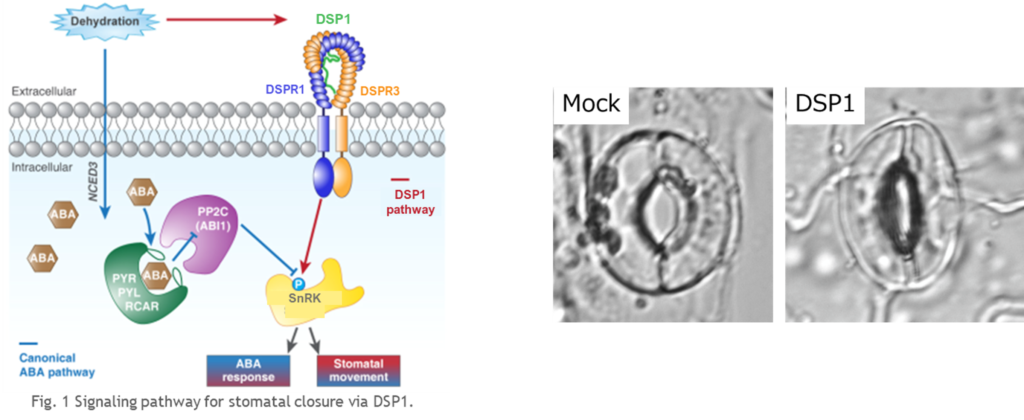Advantages
- Induces rapid stomatal closure: Demonstrates a faster response to drought stress compared to conventional abscisic acid (ABA).
- Novel mechanism of action: Operates through a distinct pathway from the existing ABA and reactive oxygen species (ROS) pathways, enabling complementary use with current technologies.
- Applicable to a wide range of plant species: Can be applied not only to model plants but also to various crops and ornamental flowers.
Technology Overview & Background
Recent global warming has severely impacted on the agricultural environment, with rising temperatures and increased drought causing reduced crop yields and quality degradation. Plants regulate water loss by opening and closing stomata on their leaves. However, under high heat, stomata can open excessively, leading to significant water loss and plant damage. This has created a strong demand for technologies that control stomatal movement to improve drought resistance.
Typically, when a plant experiences drought stress, it closes its stomata to reduce transpiration, a process preceded by the gradual accumulation of the stress hormone abscisic acid (ABA) to enhance drought tolerance. However, a time lag exists between the start of stomatal closure and ABA accumulation, and the molecular mechanism coordinating these events was previously unknown.
The inventor discovered that DSP1, a naturally derived plant peptide, rapidly induces stomatal closure. This peptide directly binds to the “DSPR1-DSPR3” receptor complex in the stomata’s guard cells, triggering a signaling cascade that leads to closure. Notably, this action occurs even in ABA-deficient mutants, demonstrating that it operates through a novel signaling pathway independent of the known ABA or reactive oxygen species (ROS) pathways. This evolutionally conserved mechanism holds significant potential for developing drought-tolerant crops and for preserving the freshness of produce and flowers.
Data
- Under short-term drought stress, DSP1 mutants lost water more rapidly than wild-type plants, indicating that DSP1 plays a crucial role in drought tolerance.
- Application of DSP1 to leaves induced stomatal closure within 30 minutes (Right figure).
- DSP1 induced stomatal closure even in ABA-deficient mutants, confirming its ABA-independent action.
 |
Patent & Publication(s)
Patent filed (unpublished).
Principal Investigator & Academic Institution
Akie Shimotono (Nagoya University)
Expectations
Nagoya University is seeking companies in the agrochemical and agricultural materials sectors interested in commercializing this peptide through licensing or developing low-molecular-weight ligand screening. Direct meetings with the researcher are available upon request.
Project ID:WL-05126


